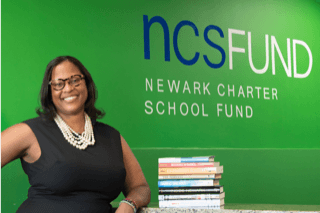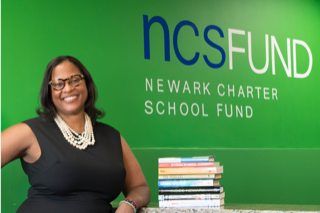An Interview with Michele Mason, Newark Charter School Fund
This interview is the twelfth in our series, Black & Bold: Perspectives on Leadership. For more about this series, click here.
Michele Mason, Executive Director, Newark Charter School Fund
Passionate. Loyal. All-In.
What are some of your career highlights?
One of the top highlights of my career was working for Teach For America (TFA) and for JerseyCAN. The work I did in Camden really prepared me for my current role at Newark Charter School  Fund. It was the first time I lived in the community where I was trying to make a difference. I got to see up close the community’s struggles, challenges, and opportunities. And I saw how students, educators, and political leaders came together to set a vision for the city. (Michele Mason pictured at right.)
Fund. It was the first time I lived in the community where I was trying to make a difference. I got to see up close the community’s struggles, challenges, and opportunities. And I saw how students, educators, and political leaders came together to set a vision for the city. (Michele Mason pictured at right.)
Another key highlight of my career was working with students at the KIPP Academy in the Bronx. I learned so much from these incredible young people who made no excuses or took any shortcuts when it came to their education. I’ve worked at many schools since my time there, but the one thing I still carry with me is our children can achieve at high levels if we set high expectations for them. I saw this in action at KIPP.
If there was a headline for your leadership journey throughout your career, what would it be?
My headline would be, “Always remember your why.” When it comes to my “why” it’s all about making a difference in the lives of Black and Brown kids. I’m working to create more opportunities for children that looked like me and my sister growing up.
As kids, my sister and I failed kindergarten. Our parents exercised choice and put us in private school. This made such a big difference for us as I have two older brothers and their journeys are quite different from ours. That’s why I feel so passionate about ensuring every child has access to a great school so they can live out their dreams the way I am living out mine now.
What are your favorite types of challenges?
Believe it or not, I like it when people tell me I can’t do something or it’s not possible. Because it’s like an obstacle course, I’ll just figure out a way around what may seem impossible to make it a reality.
Another challenge I like is disarming naysayers by learning what motivates and inspires them. In leadership, we tend to jump right to goals and outcomes. We have to remember we’re in the people business first. That’s how we will win over the hearts and minds of even our biggest detractors.
What is one book that has been meaningful or influential in your development as a leader?
Hands down, it’s The Alchemist by Paulo Coehlo. The author reminds us of the journey of self-discovery and of learning, growing, and believing in oneself.
Work in the social sector can be very personal and linked to one’s values. Can you think of a time when your values were in tension during your career and how you reconciled that tension or not?
When you work in education reform, you meet many White allies who are dedicated to the same work you are. It’s wonderfully reassuring to know the plight of our children cuts across racial and class boundaries. But at times I’ve felt some allies have an agenda more aligned with power and influence instead of what’s best for parents and their children.
When this tension rears its head, I often hear Dr. Howard Fuller’s voice saying it all comes down to money. I reconcile this with whether the money is going to the community and is it going to help our children.
Summer 2017, Democratic Representative Maxine Waters coined the phrase, “reclaiming my time,” as she thwarted Treasury Secretary Steven Mnuchin’s attempts to waste her time with nonsense. Can you share an experience in the workplace where you have had to reclaim your time? What was the context? How did you navigate it? What was the outcome?
I attended a meeting once where I was the only woman in a room full of men. Turns out they were all political operatives and they tried to talk around me. So, I started asking lots of questions, which made them feel uncomfortable because sure enough, following the meeting, I heard, “Michele asked too many questions.” For me, though, it was my way of letting them know I was listening to everything that they said and I was not going to be silenced by the exchange. That’s the moment I realized I didn’t have to have all the information or experience to participate; I could rely on my gut instincts. It’s okay to not know something because you can ask them to explain.
What’s your approach to self-care? Are there any rituals you use to survive and thrive?
I’m a big champion of self-care because you must invest in yourself. I have several coaches — life, personal, and executive — that I speak to often. They hold me accountable, help me with goal-setting, and honoring my truth. I even have a weekly prayer call with other women of color every Tuesday.
My daily routine goes like this: I wake up every day around 5:30 am. I pray, I meditate, I journal, and work out 4-5 days a week. I try to eat balanced meals throughout the day and get at least seven hours of sleep.
Another routine I do daily when I first wake up is record on my phone (Productivity app), filling in the blanks on three statements: 1) I’m grateful for….2) Today will be successful when I do these three things… and 3) A win from yesterday was….
Each day I try to be present and focused. I meditate before going to sleep and get a massage monthly.
What advice would you offer other Black women trying to develop or amplify their voice and become self-advocates?
Everyone should have their own personal board of directors. Black women are no different. They should seek out women and men who can offer advice and counsel. It’s important to have role models and mentors that will help you grow and tell you the truth.
Early in my career when I worked as a college counselor, I went to a meeting at the Harvard Club. It was at that moment I knew I had to go to Harvard. Eight years later, I did. But I wouldn’t have been successful if it wasn’t for the help of great coaches and role models who helped me formulate my goals and develop a plan to achieve them. Even years later, a mentor reviewed a job description for an executive role I was considering. She helped me map out the skills and competencies needed for me to fill a similar role.
So, if you don’t have people guiding you through your career, it’s easy to get off track. And by the way, it doesn’t have to be a big circle or even people of color; the only requirements are smart, ambitious, and hard-working for a “kitchen cabinet.”
Another piece of advice is to be still and listen to your inner voice. It’s very important to quiet the noise and ruckus around you so you can figure out your path. You have to be honest with yourself and accept the answers when they come — for they may not please everyone.
Lastly, if you want more, you need to be hungry for it. Always feed your brain with new and innovative ideas that will take you to the next level.



Comment section